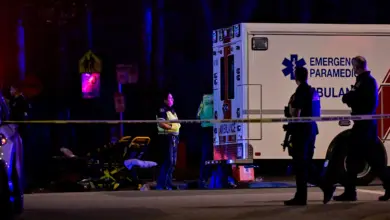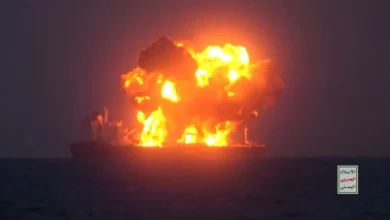Grieving Christians, many clad in black, were back praying Sunday in a blood-spattered church where 21 worshippers were killed in an apparent suicide bombing, feeling betrayed by a government they say has not done enough to keep them safe.
Dozens attended Sunday Mass at the Saints Church in Egypt's Mediterranean port city of Alexandria, while riot police backed by armored vehicles were deployed outside.
The service was marked by the grief and anger felt by a congregation devastated by the attack, which took place Saturday outside the church's door about 30 minutes into the New Year.
Many sobbed while others cried hysterically, screamed in anger or slapped themselves. "They died, they died," a woman kept saying.
Some lamented that attacks on Christians and churches often happen during usually happy occasions like Christmas and New Year. Others complained that the government was not doing enough to protect churches.
"We spend every feast in grief," said Sohair Fawzy, who lost two sisters and a niece in the attack.
"There is no security in Egypt," shrieked a man in the congregation.
Father Maqar, who led the service, did not give a sermon, preferring to express his grief with silence.
"I tell Christians to pray and pray to ease their agony," he told The Associated Press after the service.
Grim reminders of the attack remained in the church a day after the bombing. Its ground floor was stained with the blood of victims brought inside immediately after the attack. Two statues of Christ and the Virgin Mary were toppled and the benches were scattered by the impact of the blast. A red foam "2011" sign hung on the inside of the church's door was torn apart.
On the church's iron gate hung a wooden cross covered with a white sheet stained with victims' blood.
Bits of human flesh remained stuck on the gate. Young Christian men prevented cleaners from removing the flesh. "Leave them, this is pure blood," one of the young men shouted.
The attack Saturday, which left nearly a 100 people wounded, was the worst violence against Egypt's Christian minority in a decade. It sparked clashes between Christians and riot police.
The Interior Ministry blamed the bombing on "foreign elements."
The Alexandria governor accused Al-Qaeda, pointing to the terror network's branch in Iraq, which has attacked Christians there and threatened Egypt's Coptic Orthodox Christian community.
Egypt's government has long insisted that the terror network does not have a significant presence in the country, and it has never been conclusively linked to any attacks here. If Al-Qaeda were involved, it would raise the prospect of a serious new security threat within Egypt.
Hours after Saturday's blast, President Hosni Mubarak went on state TV and vowed to track down those behind the attack. "We will cut off the hands of terrorists and those plotting against Egypt's security," he said.
President Barack Obama also condemned the attack and said those behind it must be brought to justice.
The bombing stoked tensions that have grown in recent years between Egypt's Christians and the Muslim majority. It was dramatically different from past attacks on Christians, which included shootings but not serious bombings, much less suicide attacks. Christians have increasingly accused the government of dismissing violence against them or anti-Christian sentiment among Muslim hard-liners.
Al-Qaeda in Iraq has made a series of threats against Christians. The latest just before Christmas led the Iraqi Christian community to cancel most holiday festivities. After militants attacked a church in Baghdad in October and killed 68 people, Al-Qaeda in Iraq threatened more attacks and linked the violence to two Egyptian Christian women who reportedly converted to Islam to get divorces, which are prohibited by the Coptic Orthodox Church.
The women have since been secluded by the Church, prompting Islamic hard-liners in Egypt to accuse the Church of imprisoning the women and forcing them to renounce Islam, a claim the Church denies.
While the government has denied an Al-Qaeda presence, Egypt does have a rising movement of Islamic hard-liners who, while they do not advocate violence, adhere to an ideology similar in other ways to Al-Qaeda. There have been fears they could be further radicalized by sectarian tensions.
Alexandria, the famed city of antiquity which a century ago was home to a mix of Muslims, Christians and foreigners, has become a stronghold for Islamic hard-liners the past decade. Stabbings at three Alexandria churches in 2006 sparked three days of Muslim-Christian riots that left at least four dead.
Christians, mainly Orthodox Copts, make up about 10 percent of Egypt's mainly Muslim population of nearly 80 million people, and they have increasingly complained about discrimination. In November, hundreds of Christians rioted in the capital, Cairo, smashing cars and windows after police violently stopped the construction of a church. The rare outbreak of Christian unrest in the capital left two people dead.
Saturday's bombing was the deadliest violence involving Egypt's Christians since at least 20 people, most of them Christians, were killed in sectarian clashes in a southern town in 1999. In the most recent significant attack, seven Christians were killed in a drive-by shooting on a church in southern Egypt a year ago.




